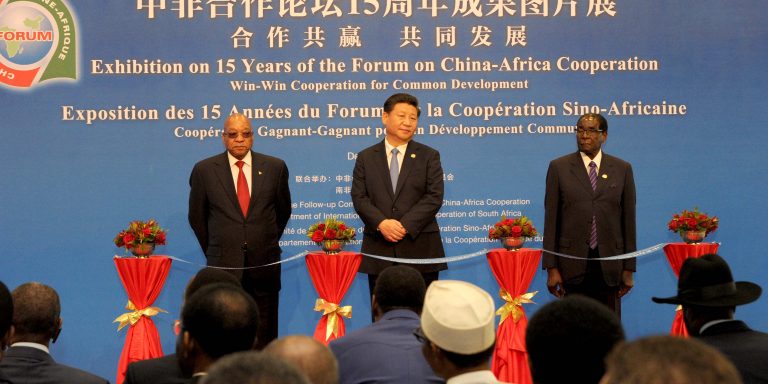INTELBRIEF
May 11, 2018
IntelBrief: Chinafrique

- China’s deepening economic ties with Africa, once broadly welcomed on the continent, are growing controversial.
- Originally focused on large capital-intensive projects cheaply financed, Chinese companies and nationals are now moving into consumer-facing activities, displacing African merchants.
- Larger numbers of Chinese nationals working in unstable areas are straining Beijing’s traditional policy of noninterference.
- In 2017, China established its first-ever military base on the continent; it is also encouraging the expansion of private security companies to Africa.
.
In 1968, China extended a 30-year interest-free credit to build a railroad from Zambia’s copper mines to Tanzania’s coast.The $400 million credit was a heavy lift for what was then a mere $71 billion economy. China’s purpose at the time was to show its presence on the world stage—a stage dominated by the United States and the Soviet Union—and to demonstrate support for the struggle of frontline African states against apartheid. The railroad opened doors for other Chinese investments linked to Africa’s extractive sectors. By 2000, Africa’s trade with China reached $10 billion annually, though a Chinese company was developing oilfields in just one country, Sudan. By 2014, China’s $10.5 trillion economy was trading $220 billion with Africa, and Chinese companies were engaged in the oil sectors of 20 African countries. Today, China controls nearly half of the world’s production of cobalt, an essential component of lithium-ion batteries that are used in cellphones and laptops, almost all of it sourced from Africa.
Chinese companies are now diversifying their endeavors in Africa beyond extractives, into infrastructure, manufacturing, telecommunications, and agriculture. This deepening economic activity, once broadly welcomed on the continent, is now generating criticism over its controversial business practices, as well as its failure to promote good governance and human rights. African civil society activists point out that, while Western firms generally employ African professionals and skilled tradespeople, Chinese firms often use Chinese nationals for all but menial labor. Those firms have been charged with brutality toward local populations as well; the country’s anti-colonial veneer is long gone. Africa’s once vibrant textile manufacturing sector was devastated from the mid-1990s by cheap imports from China. More recently, Chinese merchants have displaced Africans as textile importers and even retailers. Chinese nationals now sell farming implements directly to West Africans, often allowing them to pay in installments—terms that African vendors cannot match. With access to cheaper capital than African competitors, Chinese investors have also set up rubber, sugar and tobacco plantations. In early May, China and Nigeria entered into a bilateral currency swap worth $2.36 billion, most of which probably will be used to acquire Chinese goods for sale in Nigeria.
Beijing’s increasingly complex relationship with the continent has challenged its declared policy of noninterference in the affairs of African governments. Some meddling is covert. For example, Chinese espionage on the continent reportedly included hard-wiring listening devices into the new headquarters building for the African Union (built by Chinese firms) and hacking into their computer systems. Some interference is quite open, as Chinese nationals working in the Sahel,an area beset by terrorist groups, face significant risks to life and safety. China has expanded its presence and capabilities, dispatching more than 2,500 troops, police, and military experts to six UN missions in Africa. In mid-2017, it set up a military base at Djibouti, its first on the continent. It has also encouraged the expansion into Africa of private security companies, including the Frontier Security Group, led by Erik Prince, founder of now-defunct Blackwater, which provided security to U.S. diplomats in Iraq. The noninterference policy is vanishing even from the silver screen: Wolf Warrior 2, China’s highest-grossing film ever, features a lone Chinese hero saving African children and expatriate Chinese workers from vicious Western mercenaries.
.
For tailored research and analysis, please contact: info@thesoufancenter.org
[video width="960" height="540" mp4="https://thesoufancenter.org/wp-content/uploads/2018/05/Final-Edit-1-192.mp4" poster="https://thesoufancenter.org/wp-content/uploads/2018/05/23515455955_7e7d3135d5_o.jpg"][/video]